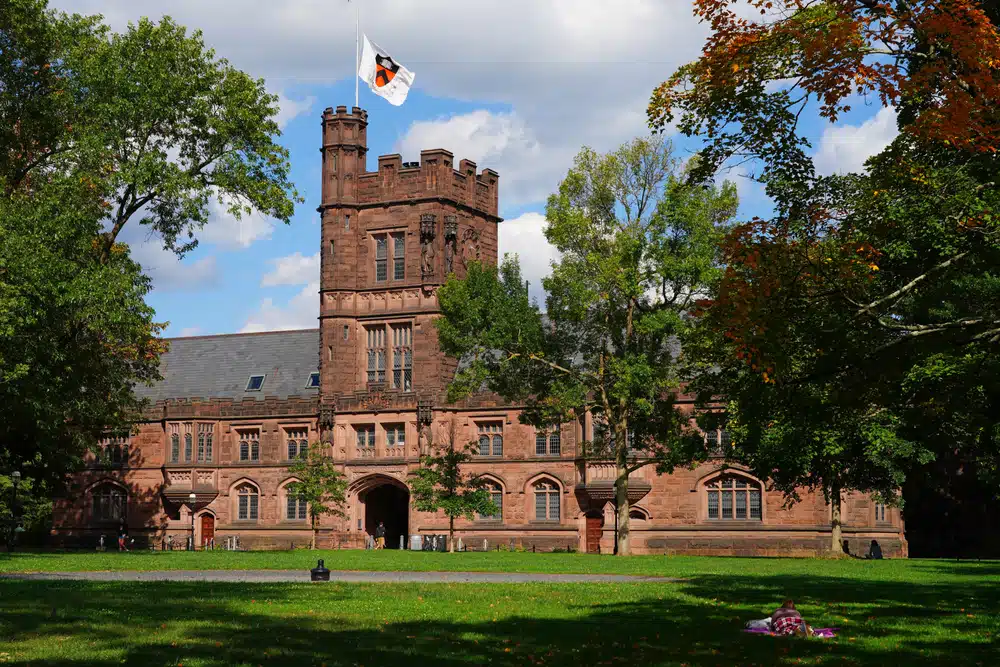Princeton Early Action and Regular Decision Deadlines 2023-2024
Princeton University, a prestigious Ivy League institution, offers prospective students two primary application options for the 2023-2024 admission cycle: Single- Choice Early Action and Regular Decision. In this comprehensive guide, we will delve into the specifics of both application paths, thoroughly explore the Princeton Early Action and Regular Decision deadlines for 2023-2024, and offer valuable insights to empower you in making an informed decision about your application strategy.
Does Princeton Have Early Action?
Princeton University provides applicants with a unique application option known as the Single-Choice Early Action program. This program is designed to give students an opportunity to apply early and receive their admission decision before the Princeton Regular Decision deadline for the 2023-2024 admission cycle. However, it’s important to note that this Early Action program is nonbinding, which distinguishes it from Early Decision programs offered by some other colleges and universities.
The nonbinding aspect of Princeton’s Single-Choice Early Action program is of significant importance. It means that when you apply to Princeton through Early Action and are fortunate enough to receive an admission offer, you are under no obligation to commit to attending the university. In other words, being admitted through Early Action does not require you to matriculate at Princeton.
As an applicant admitted through Princeton’s Early Action program, you are given ample time to make your final decision. You have until May 1 to inform the university. This extended period allows you to carefully consider your options, compare financial aid offers, and evaluate other colleges or universities that have also admitted you. It ensures that you can make an informed decision regarding your higher education journey.
When is the Princeton Early Action Deadline?
For students aspiring to join the ranks of Princeton University, understanding and meeting the Single-Choice Early Action deadline is crucial. The Single-Choice Early Action program provides applicants with the opportunity to receive an early admission decision while still maintaining the freedom to explore other options. Here’s a closer look at the essential details:
Application Deadline
The deadline for Princeton University’s Single-Choice Early Action program for the 2023-2024 admission cycle is November 1. This date is of paramount importance, as it marks the last opportunity to submit your application for Early Action consideration.
The significance of this date lies in the competitive nature of the admissions process at a prestigious institution like Princeton. Missing this deadline may mean forfeiting the chance to be part of the Early Action applicant pool.
Submitting Required Materials
Meeting the November 1 deadline extends beyond just submitting your application form. To be considered for Early Action, you must ensure that all required materials are submitted by this date. These materials include, but are not limited to:
- Application Form: You can choose to apply to Princeton through either the Coalition Application or the Common Application, both of which have specific questions tailored to Princeton University.
- Graded Written Paper: A graded written paper is a crucial component of your application. It should be submitted along with your application to showcase your academic abilities.
- School Report: This report typically includes vital information about your high school and academic performance.
- School Counselor Letter and Transcript: Your school counselor’s recommendation letter and transcript provide valuable insights into your academic and personal qualities.
- Teacher Evaluation Forms: Two teacher evaluation forms are required as part of your application. These forms should be completed by teachers who know you well and can speak to your abilities and character.
- Test Scores (if applicable): Depending on your circumstances, you may need to submit standardized test scores such as TOEFL, IELTS Academic, or PTE Academic.
The Benefits of Single-Choice Early Action
Princeton’s Single-Choice Early Action program offers several advantages for prospective students:
Early Admission Decision
One of the primary benefits of Early Action is that you receive your admission decision ahead of the Regular Decision applicants. This can alleviate the stress and uncertainty associated with the college application process, providing you with early clarity on your admission status.
Nonbinding Commitment
The nonbinding nature of Single-Choice Early Action provides students with the freedom to explore their options without feeling pressured to commit to Princeton. You can still apply to other colleges and universities and keep your choices open.
Time for Consideration
The extended response deadline until May 1 allows you to carefully consider your choices. You can weigh factors like financial aid packages, academic programs, and the overall fit of the university, ensuring that your final decision aligns with your academic and personal goals.
Meeting the Challenge
Meeting the November 1 deadline is a challenge that necessitates thorough preparation and timely action. Prospective applicants should meticulously plan and assemble all the necessary components of their application well in advance of the deadline. This approach ensures that your application reflects your best qualities and is free from any last-minute rush or errors.
It’s worth noting that Princeton’s Single-Choice Early Action program is a highly sought-after admission pathway, and the university receives a considerable number of applications. Therefore, submitting a complete and well-crafted application by the November 1 deadline is a critical step toward increasing your chances of being considered for early admission.
What Time is Princeton’s Early Action Due?
Princeton University’s Early Action deadline falls on November 1st, a pivotal date for prospective applicants. To ensure your application is submitted in a timely manner and in line with Princeton’s requirements, it’s crucial to be aware of the following key details:
Deadline Time: All Princeton University application deadlines, including those for the Single-Choice Early Action program and Regular Decision 2023-2024 admission cycle, must be submitted by 11:59 p.m. Eastern Time. This specific time is non-negotiable and is applied uniformly to all applicants, regardless of their geographical location.
Meeting this deadline is of paramount importance for anyone aspiring to be a part of Princeton’s Early Action applicant pool for 2023-2024. It ensures that your application receives the consideration it deserves and is not adversely affected by time zone differences.
Prospective students are strongly advised to submit their applications well in advance of the 11:59 p.m. Eastern Time deadline. Doing so allows for a buffer to address any potential last-minute technical glitches, ensuring that your application is successfully submitted and received by the Princeton University admissions team.
When is the Princeton Regular Decision Deadline?
While Princeton University offers the Single-Choice Early Action program for early applicants, it also provides the option of Regular Decision for those who prefer a different timeline.
For students who opt not to apply through the Early Action program, the Regular Decision deadline for Princeton University typically falls in early January, providing applicants with a well-defined timeline for their 2023-2024 admission cycle.
2023-2024 Admission Cycle Deadline: For the 2023-2024 admission cycle, the Regular Decision deadline is specifically set for January 1. This date serves as the culmination of your college application journey to Princeton.
For the Princeton Regular Decision 2023-2024 admission cycle, key application dates, and deadlines are as follows:
- Jan. 1: Application with Princeton-Specific Questions Due
- Jan. 1: Graded Written Paper Due
- Jan. 1: School Report, School Counselor Letter, and Transcript Due
- Jan. 1: Teacher Evaluation Form 1 Due
- Jan. 1: Teacher Evaluation Form 2 Due
- Jan. 1: TOEFL, IELTS Academic, or PTE Academic Test Completed (if applicable)
- Jan. 8: Optional Arts Supplement Due
- Feb. 1: Princeton Financial Aid Application Due
- Late March: Decision Notification
- May 1: Candidate’s Reply Date
Choosing the Regular Decision pathway provides certain benefits for applicants:
- Extended Preparation Time: Regular Decision applicants have the opportunity to meticulously craft their application over a more extended period. This can result in a more well-rounded and thoughtful representation of their qualifications and aspirations.
- Strategic Planning: Regular Decision allows applicants to consider multiple college options, compare financial aid offers, and evaluate their preferences without the early commitment associated with Early Action programs.
- Admissions Competition: While the Regular Decision deadline is later, applicants should be aware that Princeton’s admissions process remains highly competitive. Submitting a strong application is essential to increase the chances of securing a spot in the incoming class.
How to Apply to Princeton’s Early Action
Applying to Princeton’s Single-Choice Early Action program requires careful attention to detail and a thorough understanding of the application process. To ensure that your application aligns with Princeton’s requirements and meets the Early Action deadline for 2023-2024, follow these essential steps:
Choose the Application
Princeton University offers two application options for prospective students: the Coalition Application and the Common Application. Both of these platforms include specific questions tailored to Princeton. You can choose either of these applications to begin the process.
It’s essential to carefully review the questions and requirements on both platforms to decide which one suits your needs and preferences.
- Coalition Application: This platform is designed to streamline the college application process. It includes a set of tools and resources to assist students in preparing their applications. Princeton-specific questions are integrated into the Coalition Application.
- Common Application: The Common Application is widely used by many colleges and universities. It is user-friendly and provides a standardized application form for multiple institutions. Like the Coalition Application, the Common Application includes Princeton-specific questions.
Gather Required Materials
In addition to the application form, you’ll need to compile a set of required materials that provide a comprehensive overview of your academic achievements and qualifications. These materials are essential for a holistic evaluation of your application:
- Graded Written Paper: As part of your application, you must submit a graded written paper from a high school course. This paper should highlight your writing and analytical skills.
- School Report: The school report is a document that typically contains essential information about your high school, your academic performance, and any disciplinary or conduct-related matters.
- School Counselor’s Letter and Transcript: Your school counselor plays a crucial role in the application process. Their recommendation letter and transcript provide insights into your character, academic achievements, and overall suitability as a student.
- Teacher Evaluation Forms: Two teacher evaluation forms are required, and they should be completed by teachers who know you well and can provide meaningful assessments of your abilities and potential.
- Test Scores (if applicable): If applicable, you may need to submit standardized test scores, such as TOEFL, IELTS Academic, or PTE Academic. Check Princeton’s official website for the most up-to-date testing requirements.
Optional Arts Supplement
If you possess exceptional talent in the arts, Princeton University allows you to submit an optional arts supplement by November 6. This supplement can include a portfolio of your work in various artistic disciplines, such as visual arts, music, theater, or dance. It provides you with an opportunity to showcase your creative abilities and passion.
Princeton Financial Aid Application
For students seeking financial aid, it’s imperative to ensure that your Princeton Financial Aid Application is submitted by November 9. This financial aid application is separate from your admission application and is essential for the university to assess your eligibility for financial assistance. Be sure to follow all instructions and provide accurate financial information.
How Many Students Apply to Princeton Early Action and Regular Decision?
Princeton University’s Early Action program is a pathway highly sought after by ambitious and academically accomplished students. However, when it comes to the exact number of applicants to the Early Action program, Princeton University has taken a unique stance.
In December 2021, the university made a significant decision not to disclose specific admission data, including the number of applicants, for both the Early Action and Regular Decision cycles.
Reason for Non-Disclosure: Princeton’s decision to withhold such data is primarily driven by a commitment to reducing the anxiety associated with the admissions process. The university believes that releasing information like acceptance rates and average standardized test scores can intensify the stress and apprehension of prospective students. In some cases, it might even discourage potential applicants from pursuing admission.
Princeton University acknowledges that the college application process can already be quite demanding and competitive. By refraining from disclosing these statistics, the institution aims to create a more equitable and inclusive environment, one that doesn’t discourage promising students from applying.
Competitive Nature: What remains clear, even without specific numbers, is that admission to Princeton University is highly competitive. The institution consistently attracts a substantial number of applicants each year. While the exact figures are not available, it’s a testament to Princeton’s reputation and academic excellence.
The university continues to report certain information about its admission cycles, such as demographic data and financial aid statistics, to resources like the Common Data Set and the College Scorecard. These resources provide valuable insights into the composition of the student body, financial aid opportunities, and the academic profile of admitted students.
Should I Apply Early Action to Princeton?
At Princeton University, the choice between applying for Early Action or Regular Decision for the 2023-2024 admission cycle depends on your unique circumstances and aspirations, with each having its own set of advantages, responsibilities, and distinct deadlines. At Princeton University, Early Action can be a compelling choice for certain students, but it’s important to weigh the advantages and responsibilities it entails:
- Early Commitment: Applying Early Action is an excellent option if you are absolutely sure that Princeton is your top choice. This choice signifies a strong commitment to the university and showcases your genuine interest in becoming a part of the Princeton community.
- Competitive Edge: Early Action offers the advantage of receiving an admission decision ahead of the Regular Decision applicants. If you meet the November 1 deadline for Early Action and your application is strong, you might learn of your acceptance before the end of the year. This early knowledge can relieve the stress associated with college applications and allows you to plan ahead.
- Non-Binding Flexibility: One crucial aspect of Princeton’s Early Action program is that it is non-binding. This means that if you are admitted through Early Action, you are not obligated to matriculate. You have until May 1 to make your final decision, giving you the freedom to explore other options, compare financial aid offers, and ensure that Princeton is indeed the best fit for you.
- Preparedness Matters: To fully leverage the benefits of Early Action, it’s essential to ensure that you have completed all the necessary application materials by the November 1 deadline. This includes submitting your application form, graded written paper, school report, counselor’s recommendation, teacher evaluations, and any required test scores. Being well-prepared ensures that your application truly represents your strengths and qualifications.
- Reflecting Your Commitment: Early Action can convey a strong message to the admissions committee. By applying early, you’re showing your enthusiasm for Princeton and your proactive approach to the admission process. The university values students who demonstrate a sincere desire to join their academic community.
What Are the Odds of Getting Into Princeton for Early Action?
Princeton University is renowned for its rigorous academic standards and the exceptional quality of its student body, making the 2023-2024 admission cycle, with its respective deadlines for Early Action and Regular Decision, consistently highly competitive.
Fluctuating Admission Rates: Admission rates at Princeton can indeed fluctuate from year to year due to various factors. However, it’s essential to recognize that being a part of the Early Action applicant pool doesn’t significantly alter the competitiveness of the admission process. What remains constant is the university’s commitment to selecting the most qualified and promising students, regardless of the application cycle they choose.
The Strength of Your Application: The key to success in the Princeton admissions process, whether through Early Action or Regular Decision, is to focus on crafting a compelling and well-rounded application. Highlight your academic achievements, extracurricular activities, and personal experiences that set you apart. Your application should provide a comprehensive view of your strengths, aspirations, and what you can bring to the Princeton community.
Academic Excellence: Princeton places a strong emphasis on academic excellence. To enhance your chances of admission, ensure that your academic achievements, including your GPA, standardized test scores, and coursework, are impressive. Additionally, you should demonstrate a genuine passion for learning and intellectual curiosity.
Engagement and Impact: Beyond academics, Princeton values students who have made a meaningful impact in their communities and who are engaged in extracurricular activities. Active involvement in clubs, sports, volunteering, or leadership roles can help showcase your commitment and leadership skills.
Personal Statement: Your personal statement or essay is a crucial component of your application. It’s an opportunity to convey your unique qualities, experiences, and motivations. Craft a compelling narrative that reflects your character and demonstrates your compatibility with Princeton’s values and mission.
Can I Apply to Other Schools Early?
The decision to apply for Early Action at Princeton University, as part of the 2023-2024 admission cycle, is a strategic one, and it’s essential to be aware of the deadlines and guidelines set by the institution, offering flexibility for applicants to explore various academic opportunities while ensuring a genuine commitment to Princeton
When it comes to Princeton University, its Single-Choice Early Action policy offers certain flexibility and restrictions for applicants:
Applying to Other Schools: If you choose to apply Early Action to Princeton, you have the freedom to simultaneously apply for Early Action to other types of institutions. These include:
- Public Institutions: You can apply for Early Action to other public colleges or universities without restriction. This means you are not bound by an early program if you are admitted to both Princeton and a public institution.
- Service Academies: Applying to service academies is also allowed, and the decision is nonbinding. This means you can explore this option without being obligated to matriculate if admitted to Princeton.
- International Institutions: Early Action applications to international institutions are permitted, and the decision is also nonbinding. You can explore global academic opportunities alongside your application to Princeton.
- Nonbinding Rolling Admission Schools: If you wish to apply to colleges and universities with a nonbinding rolling admission process, you are free to do so. Your decision to apply Early Action to Princeton will not hinder your ability to engage with these institutions.
Limitations on Private U.S. Colleges: It’s important to note that there is a significant restriction. If you choose to apply for Early Action at Princeton, you cannot simultaneously apply for Early Action at other private colleges or universities within the United States. Princeton’s policy makes it clear that this choice is exclusive to the university.
Princeton’s Single-Choice Early Action policy aims to offer a balanced approach, allowing applicants to explore a variety of options while ensuring that their commitment to Princeton is sincere and not influenced by multiple binding commitments. It’s crucial to be fully informed of these guidelines when planning your college application strategy.
In summary, Princeton University extends the option of Single-Choice Early Action for the 2023-2024 admission cycle, with the application deadline set for November 1. This unique program holds the distinction of being nonbinding, allowing students to receive an early admission decision without the obligation to matriculate. However, the decision to opt for Early Action should be made thoughtfully and should align with your individual circumstances.
In conclusion, the choice between Early Action and Regular Decision at Princeton University reflects the flexibility and commitment to academic excellence that defines this institution. Whichever path you embark upon, remember that it’s not just about meeting deadlines but also about presenting a compelling application that reflects your true potential and aspirations.
By carefully considering your options and ensuring that your application is a true reflection of your capabilities, you increase your chances of joining the Princeton community and pursuing your academic journey at this esteemed Ivy League institution.
Having all the necessary information is important before choosing any course of action. AdmissionSight is always here to assist you with any questions or concerns. We have more than ten years of expertise assisting students in successfully navigating the challenging admissions process.
Consult with AdmissionSight and find out what we can do to help you get into the school of your choice by ensuring that you are sufficiently aware and well-prepared for the application process.











































